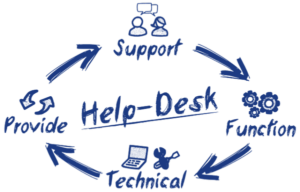Try not to fall for an online scam claiming to be tech support for your PC that really contaminates your machine with an infection, you need ways to protect your PC from viruses and malware. We’ll tell you the best way to shield your PC from malware.
It might be another year, yet an old trick is making the rounds of online PC clients.
The FBI as of late issued a notice about a PC trick that begins the phone: You get a call from somebody professing to work for a “noteworthy programming organization.” like Rush Tech Support (or Microsoft) They disclose to you your PC is sending malicious messages to them over the Web, and they’ve recognized an infection. Don’t sweat it, in any case: All you need to do is pay them a charge and they’ll remotely fix your PC by introducing hostile to infection programming on it.
When the scammer has your CC number and access to your PC, they don’t expel infections, be that as it may – they add them.
In October, the Federal Trade Commission got serious about a comparative trick that charged PC clients from $49 to $450 to “expel” malware from their PCs. The office assessed “many thousands” of PC clients fell prey to that trick.
The best approach to crush these tricks is basic enough – don’t give outsiders your CC numbers or access to your PC. Be that as it may, how about we investigate eight extra ways you can shield yourself from infections and malware:
1. Keep the latest software updates
Programming creators like Microsoft and Oracle routinely refresh their product to fix bugs that could conceivably be misused by programmers. Oracle just discharged on Sunday a refresh to its Java programming to fix a security opening programmers could have used to contaminate PCs with malware.
The product fix came after the Department of Homeland Security conveyed a warning before the end of last week about the security blemish suggesting PC clients handicap the Java module in their Web programs.
Remote tech support companies, like Rush Tech Support can make sure your computer is updated without having to leave your house. All you would need to do is call 844-880-7874 (RUSH).
2. Try not to click on malicious links inside an email.
A decent standard guideline is on the off chance that you don’t know a sender of an email, don’t click on any linksinside it. Microsoft says 44.8% of Windows infection contamination’s happen on the grounds that the PC user clicked on something. General rule of thumb, if you don’t know what it is for – don’t click it. It probably isn’t important anyway!
3. Back up your PC
Do you normally back up the data on your PC? On the off chance that you don’t – and 29% of PC clients fall into that class – you have no insurance from losing your data or recovering in case of a disaster.
You have three backup alternatives: an external hard drive, AWS management, or cloud storage.
External hard drives you can buy for $50-$200 and you will have the information readily available in case your OS hard drive crashes. The big issue is that if there is water damage or a fire in the house to cause the need for a backup, your backup is gone with the original.
AWS management most likely won’t apply to you, but you can use Amazon Web Services for backup and references on programs and software. We use this for our technician’s toolkit.
Free services like Dropbox and Drive work well for very small needs, maybe if you have several important documents and nothing else. No pictures, videos, software, etc.
We recommend LiveDrive as it has unlimited cloud storage. This is perfect for disaster recovery because it is human proof!
4. Utilize a solid password
A solid password is one that is mind boggling, with a blend of letters, numbers, and characters. Many people use the same easy password for everything. This is a huge mistake.
Password security organizations say the three most normal passwords are password, 123456, and 12345678. The organizations suggest abstaining from utilizing a similar client name/secret word mix for numerous online webpage logins.
While making a password, utilize eight characters or more and, to make them simpler to recollect, take a stab at using a short expression isolated by spaces or underscore marks –, for example, “wheres_the_Beef?”
Best practice? Utilize software like Dashlane to create and remember your passwords. You just need to recall one secret password: the one that opens your Dashlane vault. When you’ve opened it, Dashlane will consequently log you in to each site you visit requiring a password. It’s extremely convenient – quite a game changer!
5. Utilize a firewall
Just because you have an antivirus running doesn’t mean you have a firewall. Both PCs and Macs utilize firewall technology. Make certain that they are enabled and powered up. Blocking ports is a great way to keep your computer safe.
6. Limit browser security
Ensure your computer’s security settings are sufficiently high to recognize unapproved downloads. Your settings should be at least at medium. Remember, the higher the better. It may be a little inconvenient at times, but the added security may be the difference between a catastrophic meltdown and a simple block.
7. Use a pop blocker
Internet browsers can stop spring up windows and enable you to set the security for tolerating pop-ups. If you see a pop up, do not click it! Call Rush 844-880-7874 and we will handle it for you, free of charge!
Indeed, even the most cautious of PC users still risk getting malware. You should presume a PC infection if your machine turns off, freezes, or shows warning messages.
Conclusion
There are different signs the computer is having issues. These issues include a slow shut down or restart, new toolbars on your browser, a changing home page, or a PC battery depleting quicker than it should.
If your PC is contaminated, ensure your antivirus is updated.
If updating the AV and running a quick scan doesn’t solve the issue, you may need the pros. Give us a call at 844-880-7874 (RUSH)
Primary concern? Nowadays shielding yourself from infections and lost information is a lot less demanding than it used to be and doesn’t need to cost a ton of money. Take a couple of minutes today to ensure you’re secured. You’ll be happy you did.
For a free security assessment, call Rush Tech Support 844-880-7874 (RUSH).




